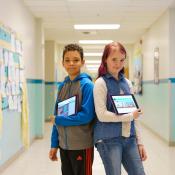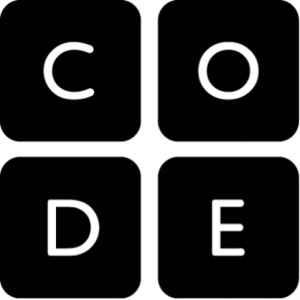Computer Science Discoveries
Impact
Code.org Regional Partners trained more than 2,000 CS Discoveries teachers in the summer of 2020. Looking back at the 2019-20 school year, 50% of Code.org CS Discoveries students were from underrepresented minorities. (See our 2019 Annual Report). Since Code.org was founded three and a half years ago, 11 countries, 31 U.S. states, and over 120 U.S. cities and school districts have announced efforts to expand access to computer science as part of the K-12 curriculum; the new Advanced Placement (AP) Computer Science Principles course has launched in over 2,000 classrooms; over 50,000 U.S. teachers have attended workshops to begin teaching computer science; over 500,000 teachers globally have begun teaching computer science classes to over 16 million students; diversity in computer science classrooms has improved for two years in a row; the Hour of Code has surpassed 350 million served – reaching one out of every 10 students on the planet; and 8 Presidents and Prime Ministers have hosted events to inspire millions more to join this teacher-powered movement.
Accomplished
- Need Accomplished
- Evaluation Accomplished
- Sustainability Accomplished
- Replication & Scalability Accomplished
- Partnerships Accomplished
- Capacity Accomplished
- Challenging & Relevant Content Accomplished
- STEM Practices Accomplished
- Inspiration Accomplished
- Under-Represented Groups Developing

I do not have a computer science background. I went through the training pilot for CS Discoveries. I would change nothing about the training. It was an incredible experience, and I felt valued and respected as a teacher and facilitator. I would absolutely recommend anything Code.org has to offer to any teacher. Period. The lesson plans are incredible.
English teacher, Hannah Ashton Middle School, Ohio
Design Principles
The programs in this database clear a high bar. STEMworks reviewed each program against the Design Principles for Effective STEM Philanthropy. Programs must be Accomplished () across all Design Principles, or be Developing (
) in a maximum of three areas.
Overarching Principles
-
Need Accomplished
Identify and target a compelling and well-defined need.
-
Evaluation Accomplished
Use rigorous evaluation to continuously measure and inform progress towards the compelling need identified.
-
Sustainability Accomplished
Ensure work is sustainable.
-
Replication & Scalability Accomplished
Demonstrate replicability and scalability.
-
Partnerships Accomplished
Create high impact partnerships.
-
Capacity Accomplished
Ensure organizational capacity to achieve goals.
STEM Principles
-
Challenging & Relevant Content Accomplished
Offer challenging and relevant STEM content for the target audience.
-
STEM Practices Accomplished
Incorporate and encourage STEM practices.
-
Inspiration Accomplished
Inspire interest and engagement in STEM.
-
Under-Represented Groups Developing
Identify and address the needs of under-represented groups.
Program Overview
Computer Science Discoveries (CS Discoveries) is an introductory computer science course for grades 7-9 that empowers students to create authentic artifacts and engage with computer science as a medium for creativity, communication, problem solving, and fun. CS Discoveries is designed from the ground up to be an accessible and engaging course for all students, regardless of background or prior experience. It provides students opportunities to engage with culturally and personally relevant topics in a wide variety of contexts and aims to show all students that CS is for them.
CS Discoveries focuses on the skills that enable students to create and express themselves in a variety of contexts and media. Whether they are developing their own website, designing an app, building a game, or creating a physical computing device, students are empowered to bring their ideas to life.
CS Discoveries is specifically designed to support new-to-CS teachers. The curriculum includes detailed lesson plans, and frequent teaching tips. The accompanying forum is an active community of support that teachers can use to discuss their practice and find additional resources. Teachers can also apply for our professional learning program for further support.
CS Discoveries was specifically designed for 7th to 9th grade classrooms and can be used in either middle school or high school. The two semesters build on each other, allowing the course to be taught as a single semester, two sequential semesters, a full-year course, or even integrated into existing technology classes.
CS Discoveries introduces students to tools and programming languages that are accessible for beginners while offering more advanced students opportunities to create sophisticated projects. Using our existing App Lab programming environment and our new programming environment, Game Lab, students will be able to transition from blocks to typed code at their own pace while learning JavaScript. Students will also develop maker skills through the study of physical computing at a very accessible cost. Text above adapted from Code.org
Code.org® is a non-profit dedicated to expanding access to computer science and increasing participation by women and underrepresented minorities. Our vision is that every student in every school should have the opportunity to learn computer science, just like biology, chemistry or algebra. Code.org offers hands-on workshops and online support at no charge; as of 2016 over 52,000 computer science teachers have been prepared by Code.org. In addition, Code.org organizes the annual Hour of Code campaign which has engaged 10% of all students in the world and provides the leading curriculum for K-12 computer science in the largest school districts in the United States.
Funders and Partners
Our top six major donors are Ballmer Family Giving, Facebook, Google, Infosys Foundation USA, Microsoft, Omidyar Network.
Additional donors can be found here: https://code.org/about/donors
Our major partners can be found here: https://code.org/about/partners
